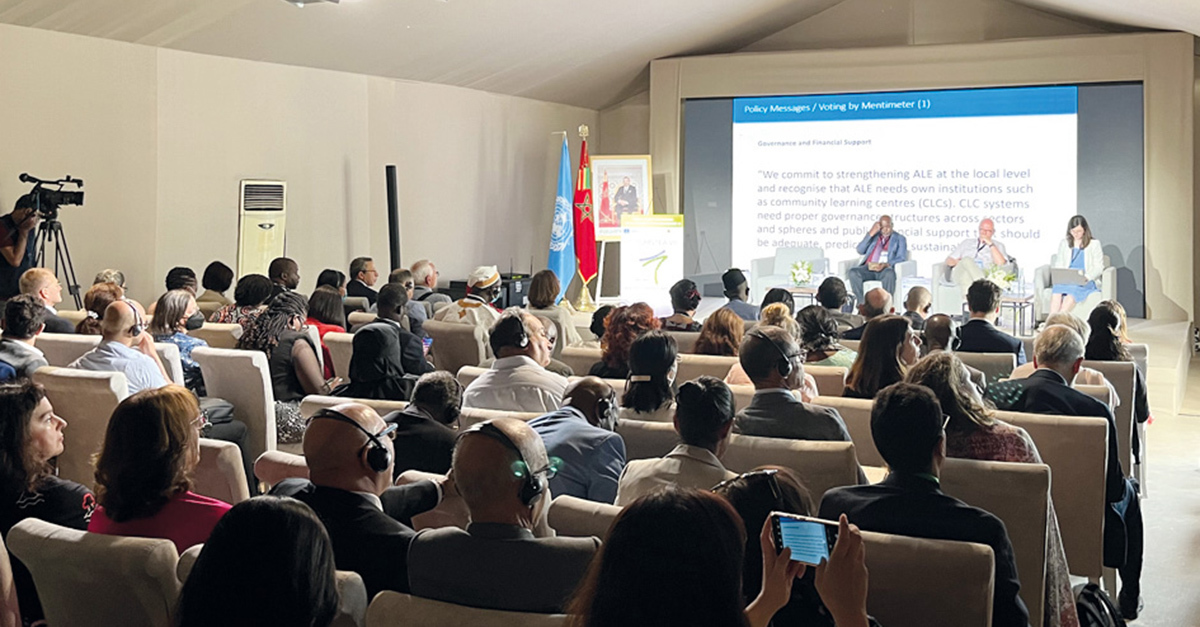The International Conference on Adult Education (CONFINTEA) has been organised by UNESCO every twelve years since 1949. As a member of UNESCO, Switzerland has sent delegates to each and every one of these conferences and made commitments to implement the corresponding actions and recommendations. At the seventh conference, which was held this year in the Kingdom of Morocco, participants focused mainly on the challenges that will affect adult education in the coming years.
Authors: Gaétan Lagger, Theres Kuratli (SERI)
Delegates from 142 UNESCO member states gathered in Marrakech and online in June to discuss international adult education goals and actions. Participants met at several plenary sessions, panel discussions and individual workshops devoted to specific topics.
Priorities
The conference focused on cross-cutting challenges such as sustainability, digitalisation and inclusion. Of course, the continued pursuit of lifelong learning remains a key concern and was therefore also addressed. Other concerns included equal opportunities in adult education and access to civic education for all.
The results of the fifth Global Report on Adult Learning and Education (GRALE V) were also presented at the conference. This combines survey data, policy analysis and case studies to provide policymakers, researchers and practitioners with an up-to-date overview of the status of adult education in UNESCO member states. The recommendations it contains for the further development of adult education and encouraging active citizenship formed an important basis for the Framework for Action adopted at CONFINTEA – the main outcome of the conference.
Framework for Action for the next twelve years
King Mohammed VI, who opened CONFINTEA VII in Marrakech as its patron, noted in his speech that the Framework for Action is intended to put adult learners at the centre of education policy and guide decision-makers into the next decade. The adopted Framework for Action demonstrates the transformative power of adult education and emphasises its importance as a key component of lifelong learning.
The Assembly agreed that adult education plays an important role in empowering adult citizens to become agents of green change and role models for youth. With regard to digital progress, the Framework for Action states that equal access for all to digital learning environments must be ensured and that new technologies can contribute to the personalisation of learning.
Another priority of the Framework for Action is to make progress in fostering adult acquisition of basic skills. This remains a major challenge for many countries. This now also includes the teaching of digital basic skills.
Active Swiss participation in discussions on the Framework for Action
The Swiss Commission for UNESCO coordinated Switzerland’s participation and took part in the discussions online. The Swiss delegation on site consisted of Maja Huber, Co-President of the Intercantonal Conference for Continuing Education and Training, Bernhard Grämiger, Director of the Swiss Federation for Adult Learning, and Gaétan Lagger, Project Manager at SERI. ‘CONFINTEA in Marrakech was enriching and important above all because it highlighted the relevance of adult education in the broad context of international education policy,’ explained Bernhard Grämiger. The participants agreed that the greatest challenges for adult education were digitalisation, climate change and the growing inequality between countries.
Switzerland was already involved in the regional consultation meetings last September and took the opportunity to submit its comments on the Marrakech Framework for Action. In particular, Switzerland supported the following proposals, most of which were taken into account in the final version of the Framework for Action:
- Fostering high-quality adult education, including for minorities and particularly vulnerable groups
- Greater funding for adult education
- Strengthening the promotion of basic skills
- Promoting new forms of digital learning
- Encouraging more people to take part in adult education in both formal and non-formal formats
The path ahead
Progress towards the goals established in the Framework for Action will be monitored in the usual manner. This will enable regular assessments of the current situation and optimisation of measures as needed. At the national level, the relevant stakeholders will also discuss what already works well in Switzerland and where adjustments are needed in order to implement the Framework for Action.

